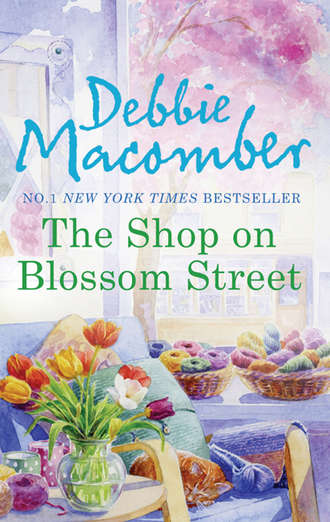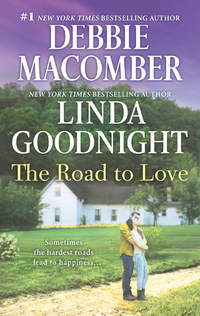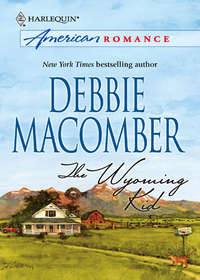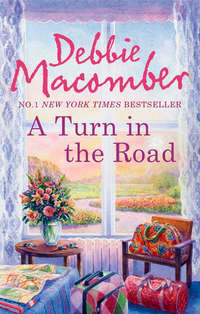
Полная версия
The Shop on Blossom Street
“So Tammie Lee is pregnant,” her husband said, ignoring her concern.
Jacqueline nodded. “Obviously Tammie Lee’s a breeder, just as I suspected.”
Reese frowned; he disapproved of her natural wariness toward Paul’s wife. But they knew practically nothing about her family. What little Jacqueline had unearthed, between the girl’s tales of aunts and uncles and God-only-knew how many cousins, had been disheartening to say the least.
The sound of a crane overhead distracted Reese momentarily and when he returned his attention to her he was frowning again. “You don’t seem happy about this.”
“Come on, Reese! How do you expect me to feel?”
“Like a woman who’s about to be a grandmother for the first time.”
Jacqueline crossed her arms. “Well, I for one am not thrilled.” Several of her nearest and dearest friends had delighted in their status as new grandmothers, but Jacqueline doubted she’d make this latest adjustment as smoothly as her friends.
“Jacquie, this is our grandchild.”
“I should’ve known better than to say anything to you,” she said angrily. Jacqueline wouldn’t have mentioned it at all if not for the argument with Paul. She’d always been close to her son. He was the reason she’d stayed in this empty shell of a marriage. Her son was everything she’d hoped for: handsome, smart, successful and so much more. He’d gone into banking and was quickly climbing up the corporate ladder—and then, a year ago, he’d done something completely out of character. He’d married the wrong woman.
“You haven’t given Tammie Lee a chance,” Reese insisted.
“That is blatantly unfair.” To Jacqueline’s horror, her voice shook with emotion. She’d given this awkward relationship with Tammie Lee her best effort. For the life of her, Jacqueline couldn’t understand why her sensible son would marry this stranger, this … this little girl from the swamps, when so many of her friends’ daughters were interested in him. Paul called Tammie Lee his southern belle, but all Jacqueline saw was a hillbilly. “I took her to lunch at the country club and I’ve never been so mortified in my life. I introduced her to Mary James, and the next thing I know, Tammie Lee’s discussing a recipe for pickled pigs’ feet or some such with the President of the Women’s Association.” It had taken Jacqueline weeks to gather up enough courage to face her friend again.
“Isn’t Mary in charge of the cookbook? It makes perfect sense that the two of them would—”
“The last thing I need is for you to criticize me, too,” Jacqueline blurted out. There was no point in trying to explain anything to Reese. They couldn’t even have a civil conversation anymore. Besides, this construction dust was ruining her makeup and the wind was playing havoc with her French twist. Reese didn’t care, though. Appearances were important, but he had no appreciation of everything she did to maintain herself physically. He didn’t have any idea how much work was involved in styling her hair and doing her makeup properly. She was in her midfifties now, and it took a subtle hand to hide age lines.
His voice rose slightly. “What exactly did you say to Paul?”
Jacqueline squared her shoulders in an attempt to preserve her dignity. “Just that I wished he’d waited a while before starting his family.”
Her husband offered her his hand to assist her into the construction trailer. “Come inside.”
Jacqueline ignored his gesture of help and stepped into the trailer. Although Reese routinely visited his work sites, this was the first time she’d been inside one of these trailers. She glanced around and took note of the blueprints, empty coffee cups and general disarray. The place resembled a pigpen.
“You’d better tell me everything.” Reese poured coffee and silently held out a cup. She declined with a shake of her head, afraid the cup hadn’t been washed in weeks.
“Why do you assume I said anything more than the fact that I was disappointed?” she asked.
“Because I know you.”
“Well, thank you very much.” Her throat was thickening but she refused to let him see how his rebuke had hurt her. “To make matters worse, Tammie Lee’s nearly six months along. Naturally Paul had a convenient excuse for keeping us out of the picture. He said they didn’t want to say anything until they could be sure the pregnancy was safe.”
“And you don’t believe him?” Reese crossed his arms and leaned next to the open door.
“Of course I don’t. People usually wait three months before they share their good news,” she said sarcastically, “but six? You and I both know he put off telling us because he knew how I’d feel. I’ve said from the first, and I’ll say it again, this marriage is a very big mistake.”
“Now, Jacquie …”
“What else am I to think? Paul goes off on a business trip to New Orleans and meets this girl in a bar.”
“They were both attending the same financial conference, and met for a drink later that evening.”
Why did Reese have to drag up unnecessary details? “They were together all of three days and the next thing I know he announces that he’s married to a girl neither of us has ever met.”
“Now I agree with you there,” Reese conceded. “I do wish Paul had told us, but it’s been almost a year.”
It still upset Jacqueline that her son hadn’t had a large church wedding the way she’d always envisioned. Jacqueline felt it was what Paul was entitled to—what she was entitled to. Instead she hadn’t even been invited to the wedding.
That wasn’t territory she particularly wanted to revisit. Her son’s only excuse was that he was in love, knew he wanted Tammie Lee with him for the rest of his life and couldn’t bear to be apart from her any longer than necessary. That was the reason he’d given them, but Jacqueline had her suspicions. Paul must’ve known she wouldn’t be pleased—and he must have realized that his in-laws would be an embarrassment. She could only imagine the kind of wedding Tammie Lee’s family would hold. The reception dinner would probably consist of collard greens and grits, with deep-fried Hostess Twinkies instead of wedding cake.
“Tammie Lee got pregnant within six months of the wedding.” She didn’t hide her contempt.
“Paul’s over thirty, Jacqueline.” Reese had that disapproving look in his eyes. She’d always hated it.
“And old enough to know about birth control,” she snapped. Paul had sprung the news on her the same way he had the marriage: over the phone without a moment’s warning.
“He told me he wanted a family,” Reese murmured.
“Not this soon, I’ll bet,” she burst out. Talking to Reese was impossible. He didn’t seem to care that Paul had married beneath him. Her daughter-in-law was nothing like the woman she’d envisioned for their son. Jacqueline had honestly tried to welcome Tammie Lee into the family, but she couldn’t bear to be around her for more than a few minutes. All that sweetness and insincere southern charm simply overwhelmed her.
“But Paul’s pleased about the baby, isn’t he?”
Jacqueline leaned against the table and nodded. “He’s thrilled,” she muttered. “Or so he says …”
“Then what’s the problem?”
“He … he doesn’t seem to think I’m going to make much of a grandmother.”
Reese’s eyes narrowed. “What did you say to him?”
“Oh, Reese,” she said, feeling terrible now. “I couldn’t help it. I told him I thought he’d made a terrible mistake in marrying Tammie Lee and that this pregnancy complicates everything.” She’d assumed that a year or two down the road, Paul would recognize his lapse in judgment and gracefully bow out of the marriage. A child made that a whole lot less likely.
“You didn’t actually say that to Paul, did you?” Reese sounded furious and that only made Jacqueline more defensive.
“I realize I should’ve kept quiet, but really, can you blame me? I’m just getting used to the fact that our only son eloped with a stranger and then he hits me with this pregnancy.”
“It should be happy news.”
“Well, it isn’t.”
“It is to our son and Tammie Lee.”
“That’s another thing,” she cried. “Why is it every girl from the south has two names? Why can’t we call her Tammie without the Lee?”
“It’s her name, Jacqueline.”
“It’s ridiculous.”
Reese studied her as if he was really noticing her for the first time. “Why are you so angry?”
“Because I’m afraid of losing my son.” Paul and her close relationship with him was the only consolation she had in a life that brought her little joy. Now she’d done something stupid and insulted her son.
“Call him back and apologize.”
“I intend to,” she said.
“You could order flowers for Tammie Lee.”
“I will.” But the gesture would be for Paul’s sake, not his wife’s.
“Why not go to the flower shop on Blossom Street.”
Jacqueline nodded. “I plan to do something else, too.” She prayed it would be enough. She hoped her son realized she was making an effort to accept his wife.
“What?”
“I saw a sign in the window of that new knitting shop. I’m going to register for a knitting class. The sign says the beginning project is a baby blanket.”
Reese so rarely approved of anything she did that the warmth of his smile moved all the way through her.
“I might not like Tammie Lee, but I will be the best grandmother I can.” Someone had to provide the appropriate influences for Paul’s child. Otherwise her grandchild might grow up eating deep-fried pickles. Or going through life as Bubba Donovan …
3
CHAPTER
CAROL GIRARD
Carol Girard had never imagined that getting pregnant could be this difficult. Her mother obviously hadn’t had any trouble; Carol and her brother, Rick, were born two years apart.
Before they were married, Doug and Carol had talked about having a family one day. Because of her high-powered job with a national brokerage firm, he wanted to be sure she was as interested in a family as he was. Doug had asked if she’d be willing to put aside her career for a few years in order to have children. The answer had been an unqualified yes. Babies were a given with her. She’d always pictured herself as a mother, always saw kids as an important part of her life. Doug would be a wonderful father and she was deeply, passionately, in love with her husband. She wanted to have his children.
Heating her lunch in the microwave, Carol glanced around the kitchen of her sixteenth-floor condo overlooking Puget Sound. She’d quit her job only a month ago and she already felt restless and impatient. She’d left the brokerage firm with the sole intention of allowing her body to relax, to unwind from the demands of her routine. Doug had convinced her that job-related stress was the reason she hadn’t conceived, and her obstetrician conceded that it was possible. A barrage of humiliating tests for both her and Doug had revealed that in addition to her age, thirty-seven, she had to contend with something called ASA or antisperm antibodies.
The phone rang and she leapt on it, grabbing the handset before it had a chance to ring twice.
“Hello,” she said cheerfully, eager to talk to anyone, even if it was a sales call.
“Hi, honey. I wondered if you were still at home.”
A momentary panic attacked her. “Am I supposed to be somewhere?”
Doug chuckled. “I thought you said you were going for a walk this afternoon.”
That was something recommended by one of the books they’d read. As a result, Carol had decided she should exercise more, and now that she was home during the day she had plenty of opportunity to spend time outside. This was all part of the program they’d discussed and agreed upon before she’d left her job.
“Right. I was just getting ready to head out.” She eyed the microwave and turned her back on her waiting lunch.
“Carol? Are you okay?”
Her husband recognized her mood, her depression and anxiety. Doug had been right to suggest she quit work. They were both frightened, since there was a very real possibility that she might never carry a pregnancy full-term. It didn’t help that they had one last shot with in vitro fertilization. The insurance company where Doug worked had its headquarters in Illinois, where state law mandated that company health coverage could pay for three attempts; their first two had failed. IVF was the very end of the technological line, the ultimate procedure the fertility clinic had to offer in the quest for a biological child. July would be their last attempt, and after that they were on their own financially. At the start they’d agreed to limit in vitro to the three attempts. If she wasn’t pregnant by then, they’d begin the adoption process. In retrospect, it had been a wise decision. The emotional devastation of the two failures proved she couldn’t endure this process indefinitely. Twice a fertilized egg had been implanted and twice she’d miscarried. No couple should repeatedly face this kind of heartache.
Carol and Doug never mentioned that this third IVF attempt was the end of their hopes, but the fact loomed in their minds. It was vitally important that she get pregnant—and stay pregnant—this time.
Carol was willing to give it everything she had. Willing to forsake the job she loved, willing to be poked and prodded and humiliated. She was willing to withstand all the doubts, confront the emotional highs and lows of their attempts at conception, all for the sake of a baby. Doug’s baby.
“I love you, sweetheart.”
“I know.” Although she said it flippantly, Carol did know. Doug had been with her through this entire process, through the doctors’ visits, the testing, through the tears, the frustration, the anger and the grief. “One day you’ll hold our child in your arms and we’ll both know that everything was worth it.” They’d already chosen the names. Cameron for a boy and Colleen for a girl. She could clearly see their child, could feel the baby in her arms, and see the joy in her husband’s eyes.
Carol held on to that dream, and the image of a baby in her arms helped her endure the most difficult aspects of the IVF process.
“What time will you be home?” It had never concerned her before, but now she regulated her life by her husband’s comings and goings. His routine shaped her own, and his return from the office was the highlight of her day. Several times each afternoon she checked her watch, calculating how many hours and then minutes until Doug was home.
“Usual time,” he promised.
Her husband of seven years worked as an insurance underwriter. Carol was the one who earned the big bucks in the family. It was her income that had enabled them to make a substantial down payment on the condo. When they got married, her wise and frugal husband had insisted they adjust their lifestyle to live on his income alone. He feared that otherwise they’d come to rely on her salary and defer having a family. They’d waited three years after marrying, not expecting problems, building up their savings. It was a good thing because even with insurance, the cost of infertility treatments was staggering. And now that she wasn’t working …
“Have I mentioned how dreadful daytime television is?” she asked.
“Turn off the TV and go for your walk.”
“Yes, sir,” she replied in military fashion.
Doug laughed. “I’m not that bad, am I?”
“No. It’s just that staying home isn’t anything like I thought.” Life at home wasn’t supposed to be endless hours of boredom, desperately searching for ways to amuse herself until Doug came home. She was used to frequent meetings, adrenaline-fuelled decisions, constant busyness. Being at home alone was a new experience and not one she enjoyed.
“Do you want me to check in with you later?”
“No, I’ll be fine. You’re right, I do need to get outside and it’s a lovely afternoon.” No place on earth was more beautiful than Seattle when the sun was shining. It was a perfect May day and she gazed out at the snow-topped Olympic Mountains in the distance, the blue-green waters of Puget Sound below her.
“See you around five-thirty,” Doug said.
“I’ll be here.” Before Carol had left the brokerage firm, it was Doug who’d arrived home first. Doug who started dinner. Doug who had the local news blaring from the television. Carol didn’t have any trouble adjusting to this role reversal of a role reversal. Right now, it was one of the few interesting things in her life.
She deposited her lunch in the refrigerator and grabbed an apple on her way out the door. They’d lived in the condo four years, and she still didn’t know her neighbors. They were upwardly mobile types just like her and Doug, with both husband and wife working long hours. Only a few had children and the little ones were rushed off to ultra-expensive day-care centers early in the morning.
Carol rode an empty elevator down to the condo foyer and headed out the double glass doors onto the downtown sidewalk. Munching on her apple as she walked swiftly toward the waterfront, she realized that one fear, at any rate, hadn’t come to pass.
All the women in the office had given her dire warnings when they learned she was leaving. The word was that stay-at-home wives and mothers battled constantly with their weight. Being in the kitchen and continually around food made it impossible to maintain a slim waistline, according to her former colleagues. That wasn’t a problem for Carol. Never in her life had she eaten more healthfully. Diet was all part of her new regime and she’d maintained her size 8 figure without difficulty.
A cool breeze blew off the water as she strolled along her usual route. Then on a whim she headed east, climbing toward Pill Hill, where Virginia Mason Hospital and Swedish Hospital were situated. She was breathing hard as she made it up the steep incline and continued slowly for several blocks, looking around at the unfamiliar neighborhood, until she came to Blossom Street.
A number of buildings were being renovated. The street was blocked off, but the sidewalk was accessible. The work on one side of the street seemed to be completed, with freshly painted storefronts and a green-and-white awning over the florist’s shop. Tulips and lilies were arranged in buckets outside the front door.
Despite the clang and racket of construction, Carol ventured down the street. A video store and a depressing brick apartment building sat at the far end of the block and a restaurant called Annie’s Café was across the street. The contrast between the old and the new was striking. The unrenovated portion of the street resembled a quaint small town with friendly merchants straight out of a 1960s television series. Granted, some of the buildings were a bit shabby, but they seemed welcoming nonetheless. It was hard to tell that Blossom Street was less than a mile from the heart of downtown Seattle with its high-rises and congested streets.
Next to the florist was another surprise: a yarn store. The shop was new, judging by the computer-lettered “Grand Opening” sign. A woman, probably close to her own age, sat in a rocking chair inside, her hands busy with a pair of needles. A large ball of lime-green yarn rested on her lap.
Because she had nothing better to do, Carol walked through the door, setting off a pleasant chime. “Hello,” she said, doing her best to sound cheerful and interested. She wasn’t sure what drew her into the shop, since she didn’t knit and had never been particularly keen on crafts.
The petite woman greeted her with a shy smile. “Hello and welcome to A Good Yarn.”
“You’re new here, aren’t you?”
The proprietor nodded. “I opened yesterday, and you’re my first customer this afternoon.” She laughed softly. “First customer today,” she corrected.
“What are you knitting?” Carol asked, feeling slightly guilty because she wasn’t a customer at all.
“A sweater for my niece.” She reached for her project and held it up for Carol to examine.
The colors, lime-green, orange and turquoise, immediately brought a smile to Carol’s face. “That’s so cute.”
“Do you knit?”
The question was inevitable. “No, but I’d like to learn someday.”
“Then you’ve come to the right place. I have a beginners’ class starting next Friday. If you register for the class you get a twenty-percent discount on your yarn purchases.”
“Sorry. I don’t think I’d be any good at knitting.” Carol felt genuinely regretful, but she wasn’t the sort of woman who was comfortable doing things with her hands. Calculating compound interest and figuring annuities, investments and mutual funds—that was where her skills lay.
“You won’t know if you don’t try. I’m Lydia, by the way.”
“Carol.” She offered her hand, and Lydia put down her knitting to clasp it warmly. Lydia was petite and small-boned, her dark hair worn short. Her brown eyes shone with intelligence, and Carol liked her right away.
“I’m starting the class with a simple project,” Lydia continued.
“It would have to be really simple if I were to take up knitting.”
“I thought I’d have everyone work on a baby blanket.”
Carol froze and tears sprang instantly to her eyes. She turned away before Lydia noticed. Under normal circumstances she wasn’t a volatile person, but with the hormone shots, her emotions seemed out of control. This was too weird, though, too much of a coincidence.
“Perhaps I will sign up for the class, after all,” she said, fingering a ball of bright yellow yarn.
“That would be wonderful.” Lydia walked over to the counter and brought out a clipboard.
These days, Carol looked everywhere for signs and portents, and she had frequent conversations with God. Without a doubt she knew she’d been sent to this shop. It was His way of letting her know He was about to answer her prayers. When she went in for the fertilization process this third and final time, she would be successful. In the not-too-distant future she was going to need a baby blanket for her child.
4
CHAPTER
ALIX TOWNSEND
Alix Townsend smashed her cigarette butt into the cracked concrete sidewalk with the toe of her knee-high black combat boots. The manager of Blossom Street Video frowned on employees smoking in the break room and rather than put up with his snide comments, she chose to smoke outside. The man was a prick, anyway, constantly complaining about the staff, the economy and life in general.
Lloyd Fund was right about one thing, though—all this construction was killing business. Alix figured it was only a matter of time before she got her RIF notice, followed by word that her apartment building had been sold. It was inevitable with all the changes taking place in the neighborhood. Either that or she was in for a big rent hike. Thanks a lot, Mr. Mayor.
She burrowed her hands in her black leather jacket and glared down the street at the dust and debris. She wore the leather coat rain or shine, summer or winter. This jacket had cost her big time, and she wasn’t taking it off so someone could conveniently walk away with it. Someone like her roommate, the overweight Laurel, although it was doubtful anything Alix owned would fit her. Leaning against the building, knee bent, one foot braced against the wall, she concentrated on the other side of the street.
All the storefronts were newly painted. The new florist shop had already opened, as well as a beauty parlor. Those were a real boon to the neighborhood—as if she had use for either one. The shop situated between them remained something of a mystery. A Good Yarn. Either it was a bookstore or a knitting shop. In this neighborhood neither would last long, she suspected. On closer inspection she decided it was a yarn store. The people who lived in her building weren’t exactly the type who got off on a ball of yarn.
A knitting shop did bring up an interesting prospect, though. With another five minutes left of her break, Alix crossed the street. She peered through the window and saw a handmade sign offering knitting classes. If she started knitting, it would get the court off her back. Maybe she could do something about those community-service hours Judge Roper had thrown at her.








